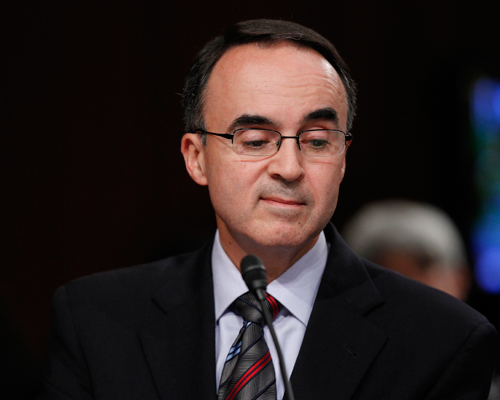Congress has been historically unproductive in recent years, a development in part attributable to the increasing popularity of the filibuster. This has meant longer waits for presidential nominees and appointees before they are confirmed. In some cases, holdovers from the Bush administration continue to work on expired terms, waiting for replacements that never come. In others, agencies go about their business with “acting” directors, or with no one at the helm. The effect is widespread, crippling agencies from the financial regulatory system and the commissions that oversee elections to health care administrators and the justice system.
 William J. Kayatta, Jr. testifies on Capitol Hill in Washington, Thursday, July, 1, 2010, before the Senate Judiciary Committee hearing. (AP Photo/Pablo Martinez Monsivais) |
Federal Judges
There are 81 vacancies on federal appeals and district courts representing nearly 10 percent of all seats in the federal judicial system. A third of those empty seats are considered “emergencies” because the seats have gone unfilled for so long. Currently, 33 judges are awaiting Senate confirmation. According to the Brennan Center for Justice, during the 112th Congress, it has taken an average of 188 days to confirm a judicial nominee. One nominee stuck in legislative limbo is William Kayatta, a judge from Maine, who some consider a “slam-dunk candidate.” Kayatta has been waiting to be confirmed by the Senate for over a year. Despite bipartisan support, including raves from his state’s two Republican senators, Kayatta’s nomination never made it to the Senate floor for a vote. In a 2011 New York Times article about the growing list of unconfirmed nominees, one former Hill staffer explained that the candidates’ records and reputations are beside the point. “This isn’t about any particular appointee — Ben Franklin could come back to life and they would oppose him,” said Mr. Engelhard, a former Republican aide on the House Financial Services Committee. |

